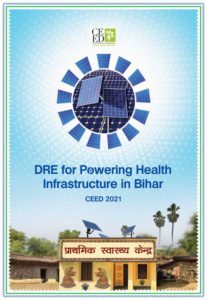Decentralised renewable energy can contribute immensely to decarbonising the economy and achieving universal health coverage, particularly in states like Bihar where health infrastructure and care needs to be strengthened. It is estimated that around 56 per cent health centres in Bihar do not have access to quality electricity. This poses limitations for regular immunisation post COVID-19 due to the lack of 24×7 electricity supply.
Bihar was one of the states that faced the worst impacts of the COVID-19 induced lockdown. In the wake of pandemic, more than 1.5 million migrant workers returned to the state and Bihar now faces the task of restarting the local economy and managing the fallout from the loss of repatriated income, while constructively engaging the unemployed but skilled and semi-skilled workforce now available in the state. The health sector in Bihar is facing a massive crisis owing to various factors including a shortage of human resources, low public spending and intermittent electricity supply which impacts the delivery of services.
Towards Clean Health Infrastructure in Bihar
Shakti supported Centre for Environment and Energy Development (CEED) to develop solutions for the adoption and scaling up of DRE-based solutions in Bihar for improving the quality of electricity supply and also increasing incomes through improved production yield, access to quality health care. DRE-based solutions have a lot of value to offer, especially in Bihar, where the advantages of DRE have already been experienced. In 2017-18, the decentralised renewable energy (DRE) sector employed 95,000 people, with most of the jobs coming from companies selling solar appliances, solar home systems, green mini-grids and productive use systems such as solar water pumps.
Research by CEED indicates a compelling argument for the integration of DRE across the health sector value chain in Bihar in order to meet the state’s energy and development goals and to improve health indicators in a sustainable way. It reveals:
- DRE has a potential of 266 MW in Bihar’s health sector and can create 13,173 new job opportunities in the state.
- DRE has an investment potential of Rs 2470 crores in the state’s health sector.
- DRE solutions can help the state avoid 11,20,414 tons of CO2 emissions bringing in several environmental co-benefits.
The study was released by Shri. Mangal Pandey, Honourable Minister of Health Department, Government of Bihar in March 2021. The webinar discussion revolved around the potential and transformative role of DRE in reviving the economy post-Covid, promoting enterprises and generating employment. While addressing the webinar, Shri Mangal Pandey highlighted the key priority of the state government to provide health services to all under ‘Saat Nishchay-2’ and pledged the commitment to increase the deployment of DRE solutions in all health centres.

